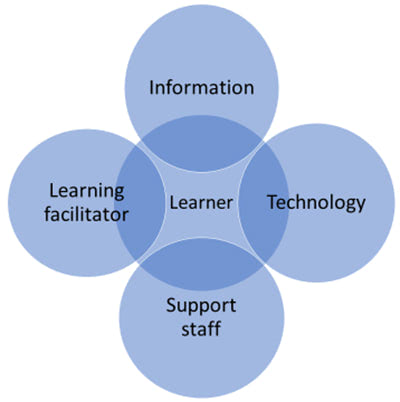LEARNING FACILITATION: A TRANSFORMATIONAL MODEL

What is being suggested below is a major cultural reform, in which the nature of learning would be transformed.

This model proposes a radical shift towards learning within FE Colleges. Some are already moving in this direction, and a lot are not.
Given the way most learners learn, and their ready access to on-line information, in my view, unless we make this shift, the FE sector as it stands currently may lose its relevance, its effectiveness, and possibly, its existence.
Future FE Colleges will need to have a mixed economy of teaching and learning support, but with a committed shift towards:
- Having more core staff as capable and committed learning facilitators rather than teachers
- Learners with core Self Managed Learning (SML) and independent learning attitude and skills
- Technology enabled to support both the above
- A ‘learning economy’ which is much more diverse and extensive, so that learners have a genuine opportunity to select ways of learning that work best for them
- Recognition that some traditionally held beliefs may no longer be appropriate – for example – attendance is crucial; teachers know best
- Equally a recognition that desired outcomes are critical (however formulated and measured) and that, to that end, ‘what works, works’
How would this operate in practice?
- For new starters, there would be a two week induction, the primary purpose of which would be to socialise the new learners into the college’s ‘new way of learning’: principles, rationale, and practice, practice, practice
- It may be helpful to have a summer school ahead of this, with incentives to attend
- Each learner group (previously ‘class’) would meet with their cohort leader (previously class tutor) in a series of 1-1s, to each discuss and agree their personal learning plan (PLP). This would cover how they wanted to learn, as well as what they need to learn
- As far as possible, the cohort leader would maximise each learner’s preferences
- During the implementation of the PLP, the learner would be primarily responsible for making it happen – their choice. But to support them in this, each learner would have a learning facilitator allocated to them – forming a key 1-1 relationship for the year
- The learning facilitator would be skilled at working with each individual in their group; so each learning facilitator would have (say) up to 20 learners in their group.
- Any subject knowledge or expertise would not be particularly relevant in this learning facilitator role. The role is essentially one of guidance, support, mentoring, coaching, networking, encouragement and feedback. It would not be one of ‘teaching’, in that ‘front-of-the-class didactic’ way.
- However, the learning facilitator might be called on by any learner (at any level) to access any subject expertise (or any other specialist expertise) that they might have.
An example
Assume the college has 100 full time ‘learning facilitators’ (a combination of existing teachers, learning coaches, TLAs, others…). Each is responsible on average for 20 learners – what would previously have been called a ‘class’. 100 FT learning facilitators x 20 learners each = 2000 learners.
Evelyn, a learning facilitator, has specific responsibility for the progress of her learning group over the year, and for the delivery of their individual PLPs. In addition to this role, however, Evelyn also has subject expertise in the Early Years syllabus knowledge, and maths.
She also has good contacts for work experience in hospitals and day centres. She is also adept at using the Century software to design on-line support programmes, and is particularly good in helping learners who are having a crisis of confidence.
Much of Evelyn’s time will be spent supporting the individual progress of her 20 learners, perhaps in some or all of the following ways:
- Helping learner A understand something she is reading
- Encouraging learner B to carry out some primary research
- Helping learner C work through a particular level of the on-line programme
- Having a conversation with learners D, E and F together to check their learning and understanding of part of the syllabus
- Having a 1-1 with learner G – from a different syllabus/level altogether, who is having a crisis of confidence
- Providing an on-demand taught session for B, D, H, I and J on a topic of their choosing (30 mins max)
- Devising and running a quiz to test the learning given to all who are working on foods for under-3s, based on a research-based assignment given last week
- 6 of Evelyn’s group are going to Alan’s 90 minute workshop on ‘Improving Your Presentation Skills’ workshop. There will be 40 learners there, from 11 different learner groups, who all nominated themselves for this workshop.
- Evelyn and Marie have decided to combine their groups, and take all 40 on a site visit to XYZ company, to be shown around and end with a Q&A session to understand how the business works…
- …and so on.
So:
- Set piece ‘teaching sessions’ are no longer at the heart of learning; however they can still take place, but ‘on demand’ as a learning preference/top up, etc
- There will be a minimum dependency on the learning facilitator as source of knowledge/subject based expertise
- The learning facilitator will have very close contact with his or her group, and a deep understanding of where they are, how they are learning, and what support they need, either from their own facilitator, or any of the other 99 learning facilitators
- Every learning facilitator has to be open to helping out on any of the 100 facilitated groups. Though each learning facilitator has a main daily/weekly responsibility for their group, they also have a responsibility for supporting any of the other 99 learning facilitators, and any of the 2000 learners.
- These front line 100 staff see themselves essentially as learning facilitators, rather than didactic, lecture led ‘teachers’, and develop the commitment, skills and practice to make this happen.
Resources
In order for this to work, there will need to be the following high quality and accessible resources:
Information highway
To support this approach, there needs to be excellent offers in all the learning areas which the learner might want to access. As a starter list, this should include:
- A sizeable library of online resources – ideally at least one for each level for each syllabus offered
- A sizeable reading library
- A sizeable list of excellent videos, tailored to specific learning programmes
- A list of people who learners can contact, who have expertise in the subject area (‘the network’); this could include alumni, and specialists from other colleges who this college has agreed to network and share resources with, and who could be part of a guest speaker programme
- A wide range of other relevant resources, including
- Webinars
- Talking heads
- Audio files/recordings
- Podcasts
- Etc…
Technology
There needs to be the quantity and quality of provision to allow 24/7 access by every learner and learning facilitator. This should equip learners to work from home, so ideally every learner would have a tablet, ipad or equivalent. Most will already have a web-enabled mobile phone….
Staff development: there is likely to be a need for helping current staff to move from ‘teacher’ to ‘learning facilitator’. The approach to this should itself model the new culture – ie not be ‘taught’. This might be best done in the quieter summer period – at the end of the summer term and at the beginning of the autumn term – possibly with a summer school in the middle?
Learner development
Learners will need support in transforming to the new culture too. This might include:
- a summer school
- induction
- support staff adept at providing extra support to learners who might be struggling with the process (though ideally the learning facilitators will themselves provide that support)
Benefits
- Many FE ‘teachers’ and some colleges are moving in this direction already
- Learners may be more motivated, more committed, and perform better within this culture
- Secondary schools are also moving in this direction, so unless wthe FE sector changes too, there will be a ‘jarring’ effect as, for many learners, they will seem to be going backwards to ‘old school’
- This approach may enhance the college’s reputation and intake among learners
- It may enhance the college’s reputation and intake for front line staff, who are attracted by this culture change
- it may well reduce operating costs: it may require fewer front line staff – but those fewer staff could perhaps be paid more…??
- It addresses, in a radical way, some of more persistent problems faced by FE colleges:
- Attendance: this may sound like heresy, but attendance is less important under this culture – learning and demonstrated achievement it what counts – not where it is done
- Cover: by and large, the need for this will disappear. If someone is off short or long term, their group can be allocated to several other learning facilitators….
- Cancelled classes: ditto….
Eventually (another heresy coming up) if the new culture works well, the front line staff are less and less important: learners learn how to learn effectively for themselves; the learning facilitators are simply part of the total resource package made available to them.
Risks
- Some current teachers might not welcome or be suited by this new approach – or be skilled enough to change
- Some learners, too…
- It may be especially risky for those in 2nd years, who are being asked to ‘switch’ mid-stream. There might be a case for treating all 2nd years differently, to minimise disruption and at the same time offer additional resource support that this change will bring
- It may take time to bring this all into effect; for the new culture to work effectively, all the pieces need to be in place at the same time – the jigsaw has to fit together. For example, it is no good offering on-line learning if the on-line learning pack isn’t ready.
Arnie Skelton, Managing Director, Effective Training & Development Ltd
Copyright © 2018 FE News











Responses